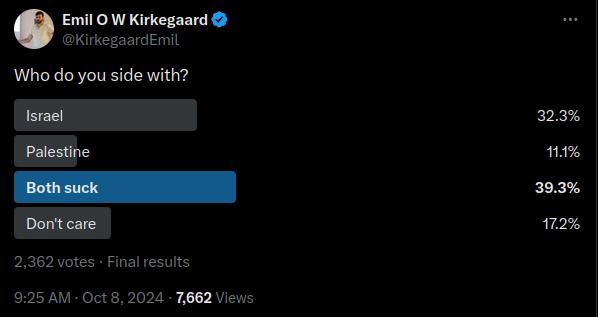A not so hot take on Israel-Palestine & Russia-Ukraine
On the arbitrariness of conflicts
I’ve been running Twitter polls occasionally like this one:
Given that my Twitter followers may be different from the Substack readers, we can re-do it here to see:
I wouldn’t say I am particularly invested in this issue. However, I think it does illustrate something interesting about foreign conflicts.
Most people have no relationship to either the (Israeli) Jews or the Palestinians, yet many have a strong opinion about this conflict? Why? In a similar vein, many people have no relationship to Russia or Ukraine, and also have a strong view on the matter. In theory, such a strong view could reflect their considered opinion. A pro-Ukraine position could result from a strong commitment to (ethnic) self-determination. A pro-Russia position could result from a strong anti-American or pro-multipolarity stance. Curiously, a strong self-determination stance would appear to offer little guidance in who to support in the Israel-Palestine conflict. While you can do your own reading, my understanding is that both peoples have long-standing ties to this land, and thus both have a decent claim on some of it.
So who to support? Many people seem to use another approach: whoever is the lesser evil. While in theory this could be calculated using whatever moral system one likes, in practice, there is endless propaganda from both sides, and it is easy to fall into a one-sided view of the matter. Typical talking points are:
Israel keeps settling more people into Arab lands.
Arabs keep shooting rockets indiscriminately at Israel.
Israel is overly harsh in their reprisals for attacks.
Arabs support a lot of prototypical terrorism against Israel.
I’m sure you can add your own further points or question some of mine.
What are some other principles one could use to choose a side in a fight?
David vs. Goliath. Many Westerners seem to prefer underdogs, most movies are about underdogs as heroes or positively depicted characters. However, from a trade perspective, it makes more sense to ally with goliath. I don’t care about this principle.
Democracies vs. others. A similar idea would be to side with the more democratic state in a kind of End of history-approach. If this just means supporting democracies vs. non-democracies, this would mean supporting Ukraine over Russia, as the former is more democratic. It would also mean supporting Israel vs. many of the surrounding countries, including Palestine which hasn’t had an election since 2006. However, in many cases, both countries are not really democracies, so this principle doesn’t apply much.
Global contribution. One could side with whichever country can be expected to provide the most to global human development, either in terms of scientific advances, useful technology, or enjoyable culture. This heavily favors Israel, but also Russia over Ukraine (per capita or not).
Strategic self-preservation. Unrelated to the morality of a given conflict, one could support whichever side leads to one’s own protection. From this perspective, it makes sense to support buffer states, those that are between you and some dangerous enemy. Ukraine is a buffer state to Russia, so Poland, Lithuania etc. have a decent self-interest in supporting Ukraine. (Russia’s other historical wrongdoings to them aside).
Feeling thermometer. Maybe you love Muslims due to personal experiences, or hate Jews for socialism, or hate Russians for socialism, or …
Generally speaking, it would seem most people don’t go through a principled ranking list of reasons in determining who to support. Rather, as with most other politics, they simply go with whichever political elites or party they already sided with. Politics is mostly top-down. They then eat up the propaganda of their chosen party/elite, and form an opinion about who is more or less evil.
From my own perspective, here are my own scores for the above considerations for Israel-Palestine and Russia-Ukraine wars.
Israel vs. Palestine:
Self-determination: It’s a draw.
Evilness: Israel is less evil.
Democraticness: Israel is more democratic.
Global contribution: Israel contributes vastly more.
Self-interest: I don’t see any relevance to Denmark.
Feelings: I prefer Jews over Arabs.
Russia vs. Ukraine:
Self-determination: Ukraine should govern itself.
Evilness: Ukraine is less evil.
Democraticness: Ukraine is more democratic.
Global contribution: Russia contributes more.
Self-interest: Ukraine is a kind of buffer, but it’s pretty distant from Denmark.
Feelings: They are basically the same ethnic group from my perspective.
I wouldn’t say I’m heavily invested in these issues though. Maybe you shouldn’t be either.



>I wouldn’t say I’m heavily invested in these issues though. Maybe you shouldn’t be either.
Great line. I strongly believe that you can only really reach the truth with a deeply dispassionate analysis of events. It's no coincidence that the most ardent supporters of Israel/Palestine/Russia/Whatever also tend to have the worst epistemology.
Basic ethics: after decades of immigration, Jews *did not displace a single Arab community through 1946* while local Arabs bought into European genocidal antisemitism and were guilty of atrocities and ethnic cleansing of several ancient Jewish communities. Arab invasions starting in 1947 produced a war in which many Arabs lost their homes. Jews won a second genocidal attempt against them within three years and now ethically hold the nation of israel.